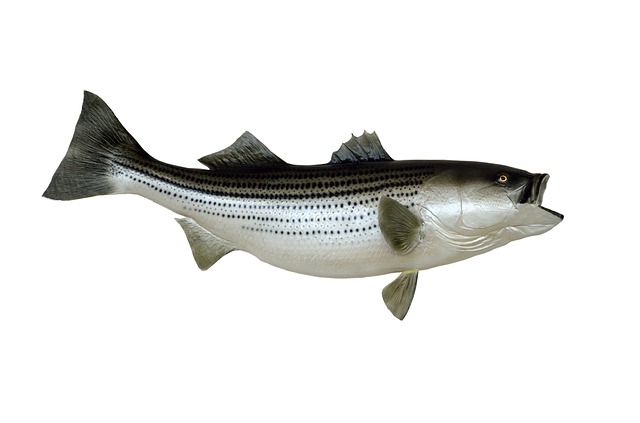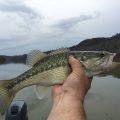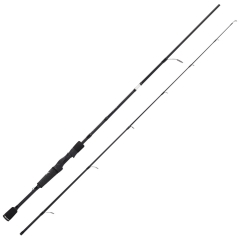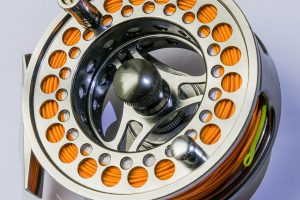Bass are a “predator fish” and they are known to be aggressive and extremely territorial. As a result of this, bigger bass and little bass do not hang around together. Fish that are aggressive will eat just about anything in sight, and bass are no different. If you put something near the mouth of a bass, they will eat it, or at least attempt to.
Bass tend to relocate frequently, often many times throughout one day, and because bass are so territorial, you can assume that they probably live a very rough lifestyle. Bass have been known to attack and often eat smaller fish that make the mistake of being in their territory. This includes smaller fish such as sunfish, and smaller bass, as well as bigger bass that are their own kind. When it comes to territory, it is basically a fight to the death, and the last bass standing takes all.

Large Mouth Bass are America’s favorite game fish. They are mainly lake fish, and that is where they typically colonize. Bass are not picky whatsoever when it comes to food, which makes them protect their territory all the easier for them, especially if you are a fish that is smaller than them. If you are on their territory as a smaller fish, you will simply become a meal or a light snack. Bass are the “apex predators” of their habitat, often hiding underneath things or in the shadows waiting to strike on their prey.
Keep in mind that there are two common types of Bass. The Large Mouth Bass, and the Small Mouth Bass. I do not believe that either of the two are any more or less territorial than the other, however I do believe that the Large Mouth Bass do have the advantage when it comes to enforcing claim over their territorial because of their size, which is probably one of the big reasons that Large Mouth and Small Mouth Bass do not typically hang around together or in the same areas. Keep in mind that a bass will attack and eat anything, including their own kind when it comes to protecting their territory.
These are the times that Bass seem to be the most territorial are:
- Pre-Spawn- More than likely because they are competing for the attention of a female.
- Spawn- Because they have found a female to mate with, and also because the male is preparing a nest in which the female can lay her eggs.
- Post-Spawn- Because there are many predators such as the Yellow Perch that will eat the eggs of bass if they get the chance. This of course results in the bass feeling the need to not only enforce their territory, but also be on their toes and ready for any predator that may try to harm their young
During Spawn season, which depends on the temperature of the water the a bass is in then it becomes even more territorial than normal. They will be alert, and immediately attack anything that enters their territory, especially near the nest. Largemouth typically spawn when water rises above 60 degrees and above and up to 75 degrees.
Just because bass are known to be territorial predators, does not mean they can let their guard down. As bass prey on many different types of creatures, they also have many different predators that prey on them. These include the following:
- Fishermen/woman for bass
- Great Blue Herons
- Yellow Perch
- Channel Catfish
- Northern Water Snake
- Black Crappie
- Common Carp
- American Eel
- Bald Eagle
- Northern Pike
- Walleye
- Muskellunge
- King Fishers and Bitterns
So obviously, just like any other fish or living creature, there is always something somewhere that is bigger than you and that will put you at risk. I do however think that it is safe to say that a Bass would definitely put up a fight if under attack.
Areas Bass tend to live in
In thinking about the bass being territorial Largemouth bass like to be in clear, vegetated lakes, ponds, swamps, creeks and rivers. This allows them to see what is around them and to be able to also protect the territory they are in. With the water being clear and with vegetation they can also have a better chance when they are spawning to have their offspring survive because they can hide eggs in the mud or sand, and they can know where it is and hide from those animals or fish which they are prey of. They also use vegetation to be able to sneak up on their prey by hiding in it before attacking. With most bass being a solitary animal outside of time for spawning their territorial nature also works well in this type of behavior to ensure they are able to live as long as possible. Most bass live around 15 years. They do not have the protection mechanism of a school, like a grouper or tuna, where they can appear to be one larger fish, which is another reason they are territorial.
In conclusion, to answer the question “Are Bass territorial?” the answer is yes. They are extremely territorial and have absolutely no problem enforcing their territory. Bass will eat just about anything as they are not picky eaters. Typically, any fish that is smaller than the bass that is caught “trespassing” on the territory of a bass will be eaten or attacked. This includes their own kind. Bass are also predatory, which basically means they are hunters. Bass are constantly moving around swimming, so just because a bass attacks and eats another fish, does not necessarily mean that it had anything to do with territory. It could just simply mean that the Bass was hungry. However, if a smaller fish does make the mistake of being in what the bass considers to be its territory, it too will more than likely be eaten. Also keep in mind, that just because bass are territorial predators, does not mean that they cannot be preyed upon. Bass hit the survival of the fittest criteria in the animal kingdom in my estimation quite well by being territorial. This way they cannot live-in constant fear of being nomadic and have a better chance of living over the long term with this type of behavior.










